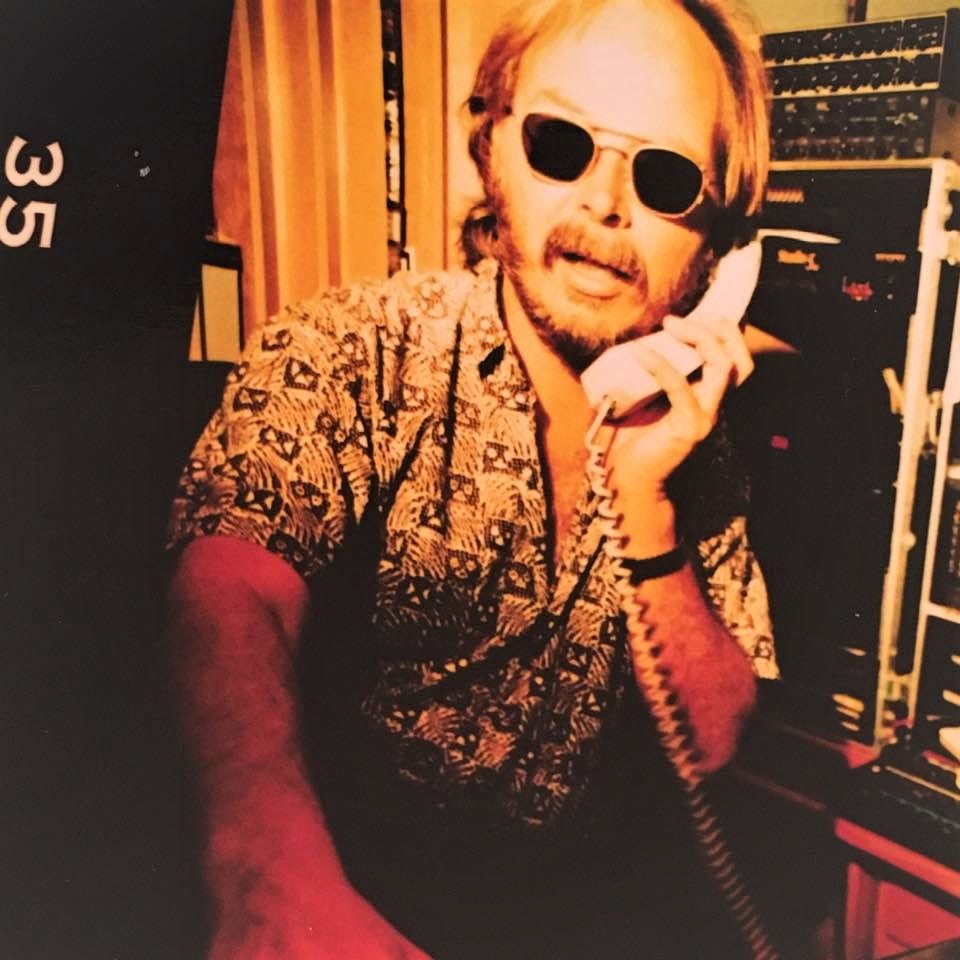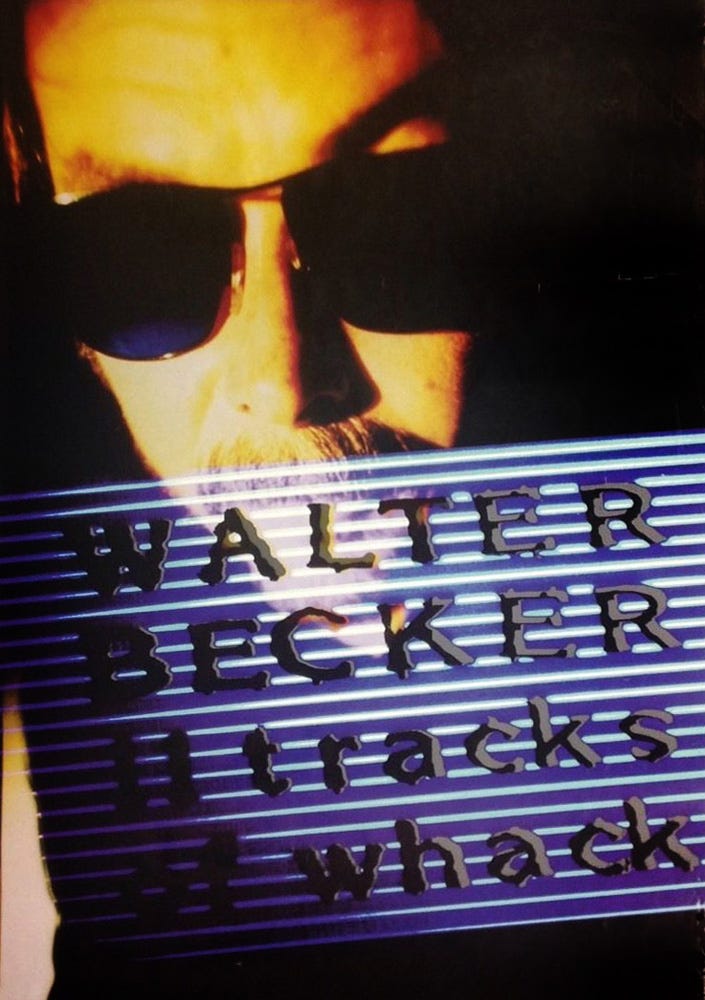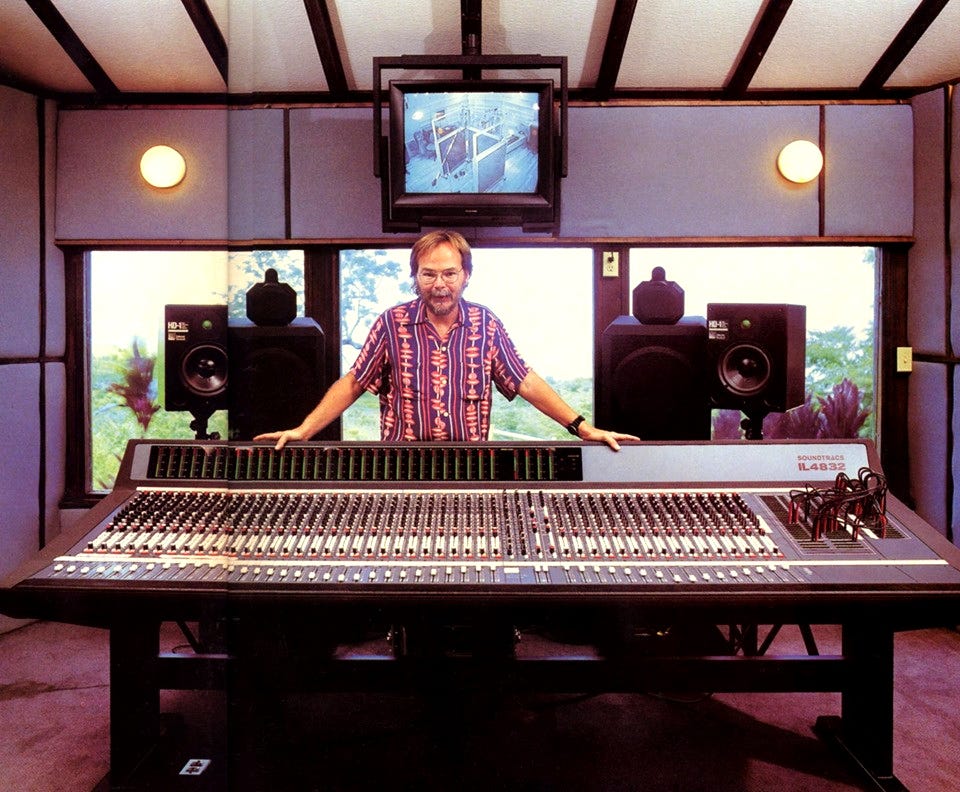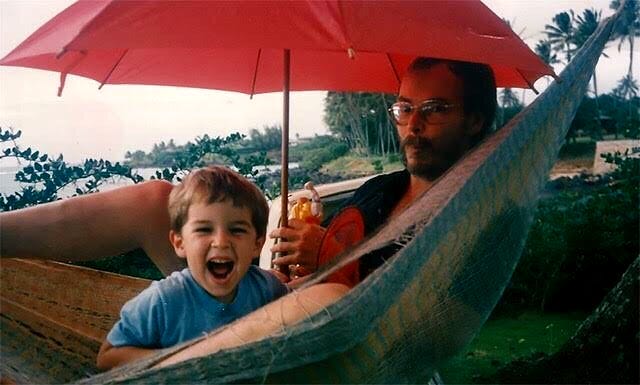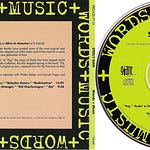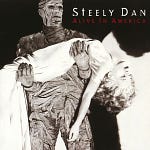As far back as the mid-1990s, Walter Becker was anticipating the incursion of artificial intelligence into the music industry.
“Next thing you know, computers will be writing our songs,” radio host Forbes Riley says to Becker in an interview for an episode of Off the Record that aired in February 1995. “There will be no humanity left.”
“I hope that you’re right about that, because it takes a long time to write a song,” Becker replies with a wink. “Here’s what you do—you program the computer with your life experiences, and then you play a couple hit records, and you say, ‘All right—merge.’ ”
The concept seemed absurd at the time. Now, three decades later, we find ourselves at the dawn of AI-assisted music creation. Common generative tools have made it possible to make songs that pass as official releases by popular artists. In the interview, Becker mentions he no longer avidly reads science fiction because he feels the genre “has been preempted by reality.” One can only imagine what he would think of Danfans armed with AI-powered tech fashioning “restored” versions of the lost “Second Arrangement.”
Becker appeared on Off the Record a few months after his solo debut, 11 Tracks of Whack, dropped in September 1994. He produced the album with his Steely Dan partner, Donald Fagen, and it can be safely assumed none of it was aided by machine learning. “Doing this, for me, was kind of partly an exercise in self-expression,” Becker says, “and being able to externalize something that I actually felt something about and state it, which wasn’t always one of the objectives with Steely Dan.”
During the interview, Riley has some cringeworthy moments (and not the kind Becker sings about on the Whack track “Cringemaker”). She tosses Becker a few dopey softballs, and makes a puzzling inquiry into whether his then-wife, Elinor, was known as the Big Kahuna. At another point, she apologizes for being “too kiss-up.” Still, their conversation is compelling, thanks in large part to Becker’s repartee missing its usual acid note. He seems to realize that, for perhaps the first time in his life, he is contented.
“I just like being in recording studios,” Becker says. “I mean, just being here, you know, I see this configuration—the glass, the guy behind the board. What better place is there to be than a recording studio? I want to see something with a lot of knobs on it, and tweak ’em a little bit.”
He speaks candidly about relocating to Hawaii to kick his substance abuse issues, start a family, and build a studio, Hyperbolic Sound, where he recorded Whack (and where work was done on Fagen’s Kamakiriad, as well as Steely Dan’s Two Against Nature and Everything Must Go). He reflects on what distinguished Steely Dan in the ’70s (“we didn’t have that earnest, screaming, spilling-of-the-guts kind of thing going on”), and how “becoming excessively perfectionistic” while recording Gaucho contributed to the fracturing of his and Fagen’s partnership—and ultimately ended the band’s golden era.
“It just got to the point,” he says, “where it wasn’t that much fun anymore.”
Transcript
[“Rikki Don’t Lose That Number” by Steely Dan]
Forbes Riley [voiceover]: Hey, I’m Forbes Riley, with good news: We get to spend the next hour with Walter Becker, Off the Record from Westwood One Entertainment.
Steely Dan—for me, that name conjures up memories of high school, singing along with “Rikki Don’t Lose That Number,” and then wondering, Who was Rikki? And what about Peg? And Aja? And Deacon Blues? And Kid Charlemagne? Who were those people they sang about? And who was Steely Dan?
Well, because there is a God, I got a call the other day that Walter Becker, half of Steely Dan, was ready to talk about his solo album, a great record called 11 Tracks of Whack, and about his old band. Great! And then I realized: I had never even heard Becker’s speaking voice. Steely Dan was never really one for interviews. So I lived with the new Becker CD for a week. I dug out all my Steely Dan records and cassettes, and said, “Let’s go.” We had a great afternoon.
[“My Waterloo” by Walter Becker]
Riley: Next thing you know computers will be writing our songs. There will be no humanity left.
Walter Becker: I hope that you’re right about that, because it takes a long time to write a song. If you could just get the computer to do it . . . Here’s what you do—you program the computer with your life experiences, and then you play a couple hit records, and you say, “All right—merge.”
Riley: The future of music by Walter Becker!
Becker: I have already been featured in Bodyboarder magazine many years ago, when we were in Fiji.
Riley: So you were on the cover with the ripped shirt and the muscles and the tan—
Becker: Yeah, you know. Pretty much, yeah.
Riley: Were you wearing the Speedo?
Becker: No, it’s considered rather gauche to be wearing Speedos in Hawaii. That’s like the ultimate form of geekhood.
Riley: Are you a big sci-fi buff?
Becker: I used to be. Not anymore. I think science fiction has been preempted by reality.
Riley: In “Book of Liars,” which is one of the tracks on your new CD, you mention a drunk Santa Claus falling down in the driveway.
Becker: Yeah.
Riley: Is this somebody you’ve seen, somebody you’ve been, or your image of Christmas at all?
Becker: No, well, of course, we’ve all seen drunk Santa Clauses. I mean, it’s kind of a famous circumstance to know that many of the Santas at the malls are out on the streets or winos or whatever. But there was also a story in legend—perhaps it was a legend, I never could tell if it was true or not—in my family, related to me by my grandmother, that my father one year had come home inebriated on Christmas Eve and knocked over the Christmas tree.
I just like being in recording studios. I mean, just being here, you know, I see this configuration—the glass, the guy behind the board. What better place is there to be than a recording studio? I want to see something with a lot of knobs on it, and tweak ’em a little bit.
Riley: And a couch somewhere.
Becker: Leather couch, air conditioning, big speakers, yeah. I now have my own recording studio in Hawaii.
Riley: So now you can just stay home.
Becker: I can go to my own studio, and just sit there and play CDs if I want.
Riley [voiceover]: I guess I picked the right spot for the interview: Westwood One’s recording studio A, complete with a leather couch and my engineer, Fred, behind the glass. We are going to talk about your new CD, 11 Tracks of Whack.
[“Lucky Henry” by Walter Becker]
Becker: Yeah.
Riley: There are 12 tracks on that—I counted.
Becker: We noticed that, too.
Riley: You didn’t miscount. There’s a reason.
Becker: We didn’t miscount, and the only reason was just for the little joke of it, I think.
Riley: A lot of your stuff has little jokes in it, doesn’t it?
Becker: Yes, some smaller than others.
Riley: On one of your CD jackets, there’s a whole paragraph on how it was recorded, and how it should be edited, and how it should be played, and I thought—let me figure out which one it is.
Becker: Oh, I know what that is. Probably Katy Lied, huh?
Riley: It is. Is that an inside joke?
Becker: You know what that was? If you look at Atlantic jazz CDs from the ’50s, that’s basically the whole design of the back of that jacket and that little paragraph is a sort of a spoof of exactly what—if you go to Tower Records or something and get an old John Coltrane record, like Giant Steps or something, you’ll see the same layout. It all looks the same, and they have a very similar sort of incredibly pretentious little paragraph at the bottom about how it was recorded and so on.
Riley: Do you guys make each other laugh a lot?
Becker: Yeah, we do, we do. That’s true.
[“Doctor Wu” by Steely Dan]
Riley: The writing on these songs. I mean, the lyrics are unlike anything I’ve ever read before. It reads like poetry. It doesn’t read like songs at all.
Becker: Oh, well, I guess that’s good.
Riley: It’s more like storytelling.
Becker: Yeah, you know I kinda felt that, having done this for all these years, I had to write something a) that had some substance to it, beyond just immediately . . . You can write a good song with lyrics that mean practically nothing, and it happens all the time. And you hear these things, and like, what does it mean? Well, maybe it means nothing or it means just some little, it’s a little ditty—and there’s nothing wrong with that. But I kinda felt like if I was gonna do this, I should try and write something that at least if you looked at the lyrics on a page of paper they looked kinda good, you know.
Riley: They also look really personal.
Becker: Yeah, and that was the other thing. Doing this, for me, was kind of partly an exercise in self-expression and being able to externalize something that I actually felt something about and state it, which wasn’t always one of the objectives with Steely Dan. In some cases, we basically just wanted—we were more obscure or whatever.
Riley: You pronounce your son’s name . . . ?
Becker: Ka-VAI.
Riley: Ka-VAI.
Becker: His name is actually Kawai, like the Kawai piano, the Japanese pianos: K-A-W-A-I.
Riley: Did he—was he embarrassed that he’s in a song?
Becker: Oh, no, he was very proud.
Riley: Is that a true song?
Becker: Yeah.
Riley: I hear names. Who is Eldon?
Becker: Eldon is one of his colleagues—at that time, one of his friends that he plays with. You know, a few of these songs, I kinda wanted to—I’m sitting around my house trying to think of things to write, and there was things going on all around me, so I figured, why not? I didn’t want doing what I’m doing to isolate me from my family. I didn’t want to suddenly become a reclusive artist and withdraw from being present in the lives of my family.
Riley: Speaking of your family, word has it, as it was flying around here, your wife is called the Big Kahuna?
Becker: [Laughs] Not that I know of. Who told you that? Who told you that? Wait a minute. Oh, did Bobbi? Bobbi is responsible—Bobbi and/or Rachel are responsible for that. No, that’s not true.
Riley: Maybe just in the Becker household she’s the Big Kahuna.
Becker: Uh, not that I know of. Not that I know of. But this could be the start of something.
[“Kid Charlemagne” by Steely Dan]
Becker: This wedding thing keeps coming up. I mean, what’s the deal?
Riley: Three years, he looks at me and says, “Do you want to do it?” And I’m like, “Yeah. Uh, OK.”
Becker: Are you sure he meant marriage, though, when he said, “Do you wanna do it?”
Riley: Yes, and he got the ring and all that.
Becker: Oh, man, well, you’re past the point of no return, pretty much.
Riley: My fiancé proposed as Santa Claus down on one knee. How did you propose to the Big Kahuna?
Becker: The Big Kahuna. Oh, man, I hope that this is not gonna be broadcast in Hawaii.
Riley: We’re just gonna send you this little piece.
Becker: I think, really—let me just say, Elinor, that I think Bobbi is responsible for this.
Riley [voiceover]: Oh, sure. He says that now. Well, keep listening, Hawaii and every other state. We’ll be right back with Walter Becker. I’m Forbes Riley, Off the Record.
Riley: You and Donald met in college?
Becker: Yeah, we were students at Bard College, which is in New York State, a couple hours from New York.
Riley: What were you studying?
Becker: Well, I was a sort of nominal literature major. I don’t think studying was the word for what I was doing.
[“Josie” by Steely Dan]
Riley [voiceover]: Walter Becker and Donald Fagen—Steely Dan. They were the hippest rock group of the ’70s. Can’t Buy a Thrill, Katy Lied, The Royal Scam. Oh, yeah, they were cool. They hated touring. They loved the recording studio. And they worked with every great studio musician who drew breath in that decade. They were, and are, very smart. Trust me. I’m Forbes Riley, talking with Walter Becker, Off the Record.
Riley: I was thinking one of the most interesting things about your music is that it hasn’t been accessible to a lot of kids. So I’m going to start out with saying there’s a whole new generation that’s going to listen to this show, who may have not heard Steely Dan before, and they have some real basic questions like: Where does the name Steely Dan come from?
Becker: Well, that’s a good question. The name Steely Dan actually occurred in a novel by William Burroughs called Naked Lunch, and it was the name of a dildo in that novel. Did you know that?
Riley: No, I did know that. But I just can’t believe you said “dildo” on my show.
Becker: Well, what can we say—“marital appliance”? That’s worse, you know? So anyway, it was a dildo in a little humorous fantasy skit that occurred in that book, one of many such things. And Donald and I had used it in a song at one time when we were in college, some mention of that. We got to Los Angeles and signed a record contract, and we were telling these guys that we had a group, and they said, “All right, what’s the name of the group?” and we racked our brains. We had been using our names—Donald’s and my names—in a kind of, you know, Becker and Fagen, or Fagen and Becker: sounds like a delicatessen, right? So anyway, we latched onto this name, and we figured we had a steel guitar player in the band, and there was a guy named Don, which sounded kinda like Dan, and we thought it’d be a neat little joke that people would think there was this guy, Steely Dan—and then later, at some point, they would find out that it was a marital appliance, to use the politically correct term.
[“Reelin’ in the Years” by Steely Dan]
Riley: What’s interesting to me is that your music was such a departure from all the music that was going on at that time. Is that something that you heard in your head and said “No, my music is gonna fuse the jazz riffs, the Duke Ellington, the whole other aspect of music”?
Becker: Both Donald and I were big jazz fans. Primarily that was what drew us into music, I think, in the first place. When we started writing, we were trying to—and both, may I say, literature buffs and so on—so when we started writing, we had this vision and this technique that we tried to develop of including elements of jazz-harmonic elements, with blues and rock: rock and roll beats, kind of bluesy melodies, and lyrics that were suggestive of various literary genres of the day or styles, primarily sort of black humor type of thing that was predominant in the ’60s. Kurt Vonnegut kind of stuff.
[“Babylon Sisters” by Steely Dan]
Riley: I have some questions about the early stuff. Just because, I’ll be sitting there listening to it—and I realized as I was re-listening to it: I don’t think I ever knew all the words, ever heard all the words.
Becker: Probably just as well, too, huh?
Riley: I thought “Babylon Sisters” was “Babble on Sisters”—you know, they’re just kind of talking.
Becker: Well, that’s nothing. My wife thought that the line in “Bodhisattva” that is, “The sparkle of your China,” she thought that was, “The spark of your vagina.” How about that?
Riley: That’s very funny.
Becker: But, you know, on the other hand, it’s an even punchier line than what we had.
Riley: What did “Bodhisattva” mean?
Becker: Oh, bodhisattva is a Buddhist concept. It’s an individual who has attained enlightenment, and who is therefore able to go onto nirvana, so to speak, or move on away from this plane of existence, but who chooses to stay in this plane to help other people attain enlightenment.
Riley: Are you spiritual?
Becker: Oh, uh, well, uh, I don’t know, maybe with a very small S or something like that. I’m certainly not a practicing Buddhist or anything like that.
[“Surf and/or Die” by Walter Becker]
Riley [voiceover]: Yes, those were monks chanting. They turned up at Walter Becker’s recording studio in Hawaii to bless it and his solo album. You know, I thought it kinda gave off a glow.
Riley: Here’s another personal question. Because I’m looking at your eyes. I don’t get to see those that much on album covers. You and Donald on Aja are wearing glasses, on your new one you’re wearing sunglasses. Was that a conscious thing?
Becker: You mean were we conscious at the time? In some cases, on a relative scale of conscious and unconscious, I think in some cases we were less conscious. But, you know, it’s obviously an attempt to—either at concealment or to just have some sort of stylish aspect.
Riley [voiceover]: I’m Forbes Riley. He’s Walter Becker. And we’re talking about his cool days with Steely Dan. Off the Record.
[“Hey Nineteen” by Steely Dan]
Becker: After we did the Gaucho album—that was the last album we did—it kind of took a real long time to do, and we were falling prey to our ever-increasing attempts to top ourselves with what we were doing. It finally got to the point where we felt that we had played out the hand of working together, at least for the time being. So we said, “That’s it.”
Riley: And you moved to Hawaii.
Becker: I ended up moving to Hawaii shortly after that.
Riley: Why Hawaii?
Becker: Well, I had been there and I always thought it was a great place, and so I wasn’t going to work for a while, so I figured, well, hell, let’s go see about this. And I started going there for vacations and hanging out and spending a lot more time there, and eventually I met the lady that’s now my wife and, you know, like that.
Initially when I was living there for about two and a half years, I didn’t really do much music stuff. At that point I was sorely in need of a refreshed outlook on life, and so I spent some time trying to develop that. I quit smoking, drinking, drugging, and everything else, and kind of had a little change of direction there.
[“Bad Sneakers” by Steely Dan]
Riley: You had a son.
Becker: Had a son, yeah, that’s true. Actually, my wife had him.
Riley: Well, you both had him.
Becker: Yeah, that’s true.
I read that attention deficit article—in Newsweek, was it, or Time magazine? And I thought it was pretty good, but I didn’t finish that either.
Riley: Oh, a stand-up comic right here, ladies and gentlemen.
Becker: Do I have to stand up for something like that?
Riley: These days, that was very classic.
Riley [voiceover]: Is he auditioning for my job?
[“Girlfriend” by Walter Becker]
Riley: I’m gonna go back to the title of your new CD. You know what, I’m kind of excited because I got that you have this kind of sense of humor, but I thought, Nah, that can’t be.
Becker: “Nah, that wouldn’t be.”
Riley: A lot of people take what they do so seriously.
Becker: Right, I think that that’s true. One of the things that distinguished what Donald and I were doing all through the years was that we didn’t have that earnest, screaming, spilling-of-the-guts kind of thing going on. We had a kind of a—we were looking askance at ourselves and everything else at the same time.
Riley: On the jacket cover for Whack, I just wanna read this for people. They’ll get a chance when they see it in the store: “A first stab or crude attempt, for example, “Let your brother have a whack at the circular saw!” Did you make that up?
Becker: Yes, I did.
[“Do It Again” by Steely Dan]
Riley: That says everything about you, doesn’t it? That’s your view on the world.
Becker: Right. Yeah, kind of. Actually, to some extent, that was a kind of a parody on my wife’s parenting style, which I’ve always described as, “Oh, let him play with that hand grenade. He’s a smart kid, he won’t pull the pin.” You know, if you raise kids like that, they get to be smart kids and they don’t pull the pin, although that’s an exaggeration, obviously. But when I was working on this record, I wanted to avoid certain—you know, how people who have gone through various excesses in the past have to be careful not to fall back in those patterns. One of the problems that Donald and I had gone through was just working things to death and becoming excessively perfectionistic, and I think ultimately that’s why we stopped making Steely Dan records when we did. It just got to the point where it wasn’t that much fun anymore.
Riley: Can we expect another Steely Dan album?
Becker: Well, you can, but only at peril of disappointment.
Riley: I knew you were going to turn that around.
Becker: But at this point we’re working on a live album from the tapes that we did last summer, and then we’ll just go on from there and see how far we get. I’d rather not predict that anything is gonna happen at any given time, frankly. We’ve kinda decided we’re gonna write some songs and go in and do something with them.
Riley: Well, I’m excited not only that you produced your own solo work, but it would be nice to see you guys. I dunno, we love to see that. We love the Stones getting together, the Eagles. I dunno, maybe it keeps us from getting older that you’re still here and everything is OK and safe. It’s funny—
Becker: Well, if only it did keep us from getting older. But the truth is that it’s probably a symptom of us getting older that we think, Oh, great, here come these old, crusty old bleeps, and they’re gonna make another record.
Riley: What would you be doing if you couldn’t play music, if you didn’t have that gift?
Becker: I can’t imagine. I’d probably be saying things like, “Would you like fries with that?” At a couple points in my life I’ve said to myself, “Well, wouldn’t it be great to do something different, have a whole new set of experiences?” But I’ve never really come up with that other thing that I could do.
Riley: Well, I’m grateful you haven’t yet, because I can’t imagine my life without Steely Dan in it.
Becker: Oh, that’s very nice of you to say.
Riley: Aw, I’m blushing. It’s almost too kiss-up, but I felt like saying it. I may never get this opportunity again.
Becker: I don’t think it’s ever wrong for an interview—ever possible for an interviewer to be too kiss-up, do you? No.




